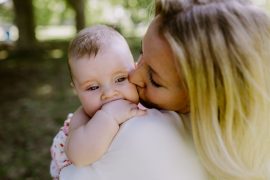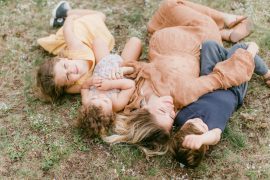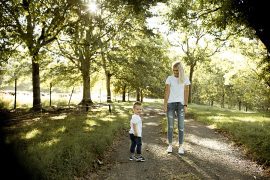Over five hundred interviews later, I found that roughly a quarter of the children interviewed had, named, and played with IFs. That’s a lot of hallucinating. But any temptation to buy into the notion that children are confusing fantasy from reality was destroyed during the very first interview of the project, with Nicole, a girl one month shy of three.
Nicole told about two friends, Leah and Coda, a girl and a boy. Coda had died earlier that month but came back for the interview. “Where are they now?” I asked. She looked around the room and pointed. “Leah’s over there.” I asked about Coda and Nicole got up, went to the doorway, looked down the hallway of the building, beckoned with her arm for the friend who was apparently down the hall, squatted down and talked to someone I could not see, and finally came back to her chair declaring, “Now Coda’s here too!” I responded, “Oh that’s great, maybe Leah and Coda would like stickers too?”
In response, this girl of two years and eleven months looked me in the eye, a bit confused and declared, “They’re pretend!” (The look on her face said, “you idiot.”) Not only did she know the difference between pretend and otherwise, she was bewildered when I seemed not to know.
More and more research demonstrates that Freud and Piaget-for all their contributions to thought-got the picture of early childhood wrong. If anything children start with a realistic, sense-based engagement with the world. Grabbing hands, sucking breasts, stretching limbs, crawling along a firm floor. They come into the world attuned to faces and movements, they have an intuitive sense of orientation, of less and more, of attraction to particular sounds and voices. All realistic. Later comes the ability to pretend. Imagination is more like language, a developmental achievement of childhood.
Children with IFs are no more likely to be shy or lonely than other children. Instead, they appear to be deeply social, so much so that they make up more friends. They are also playing with what psychology calls “theory of mind,” that is, with points of view of others-nimbly moving between perspectives. Leah thinks this, Coda wants that, you can’t see my friend but God can. These are children practicing perspective-taking through imagination, playing out who sees what or who knows what, all crucial to sharing life with others. These are children eager to create a social world hospitable to elephants and robins, aliens, and long jump buddies. They are the opposite of egocentric; they are exocentric, considering the minds and hearts of others-which of course is an act of the imagination.
This is a very different picture of the childhood psyche than Freud or Piaget imagined. While it may be too easy or romantic to say that children live closer to Eden than adults, given half a chance they may be more open to the treasures of friendship, life with others, and hospitality for creatures great and small if not shape-shifting. They may reveal the possibility of a rich social imagination and what it means to be human in relation to a larger world filled with all manner of creature.
But a question for our culture (whether of a household or society) is what devilish forces tempt children out of this deep concern for life together and into the dusty land of east of Eden.
J. Bradley Wigger is a professor of childhood studies and education at Louisville Presbyterian Seminary and the author of the book, Invisible Companions: Encounters with Imaginary Friends, Gods, Ancestors, and Angels (Stanford University Press, July, 2019).* He has been a recipient of several grants and fellowships to explore children’s imaginations, most recently as a 2018 Henry Luce III Fellow.
[The research was approved by the school’s Institutional Review Board for Research with Human Subjects.]










